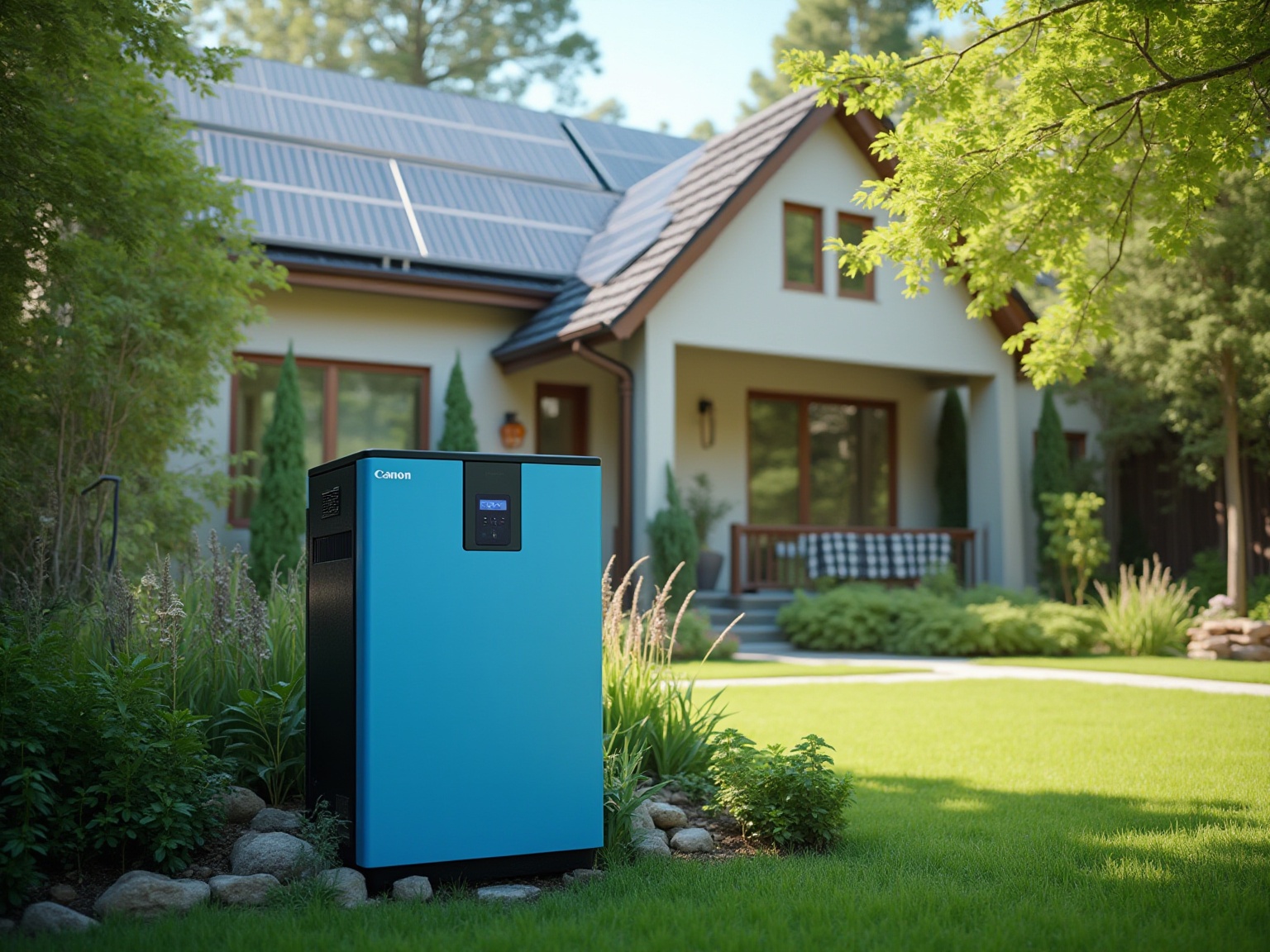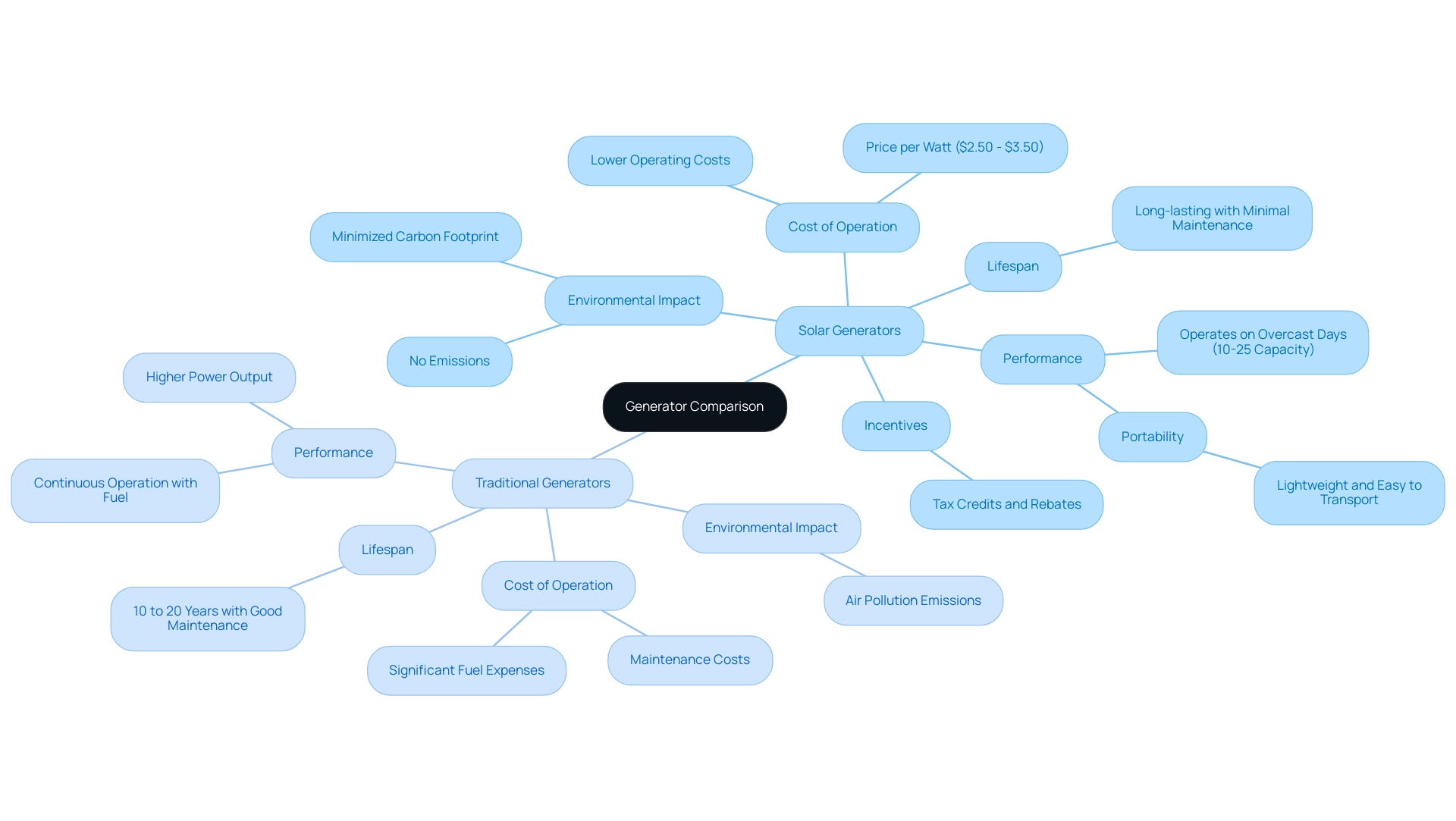Overview
Solar panel home generators work by converting sunlight into electricity through photovoltaic cells, allowing homeowners to store energy for later use or power their appliances directly. The article emphasizes their growing popularity due to benefits like significant cost savings, reduced environmental impact, and advancements in technology, making them an increasingly viable and sustainable energy solution for modern households.
Introduction
As the world shifts towards sustainable living, solar panel home generators are emerging as a beacon of hope for eco-conscious homeowners. These innovative systems harness the sun’s energy, transforming it into usable electricity that can power everything from essential appliances to outdoor adventures.
With the solar market booming and advancements in technology making solar solutions more accessible than ever, now is the perfect time to explore how these generators work, their benefits, and how to choose the right one for specific needs.
This guide delves into the mechanics of solar generators, compares them with traditional backup options, and offers insights on selecting the ideal model to enhance energy independence while contributing to a healthier planet.
Whether looking to reduce energy bills or seeking reliable power during outages, understanding solar generators can empower homeowners to make informed choices for a sustainable future.
Introduction to Solar Panel Home Generators: How They Work
Solar panel home generators utilize the power of sunlight through a technology known as photovoltaic (PV) cells. When sunlight strikes these cells, it creates an electric field that produces direct current (DC) electricity. This electricity can be stored in batteries for later use, ensuring you have power even when the sun isn’t shining.
Alternatively, it can be converted into alternating current (AC) electricity with the help of an inverter, making it suitable for running household appliances. This simple procedure not only demonstrates the efficiency of photovoltaic generators but also emphasizes their dependability as a source of renewable power. As homeowners increasingly turn to these solutions, it’s fascinating to note that the market for renewable energy in the United States is currently valued at an impressive $63.6 billion, reflecting a robust ecosystem supported by nearly 280,000 jobs in this sector.
The growth of residential net metered energy installations has been shown to enhance a state’s economic output and public health, creating jobs and reducing energy costs for families. Historically, the pricing of photovoltaic equipment has decreased by an average of 20% each year over the past decade, making this technology more accessible and economical. Furthermore, government initiatives like the Biden-Harris administration’s program aim to enhance equitable access to renewable energy, ensuring that the advantages of this technology reach diverse communities.
With improvements in photovoltaic cell effectiveness and an increasing worldwide interest in renewable technology, now is a perfect moment for environmentally-aware homeowners to investigate the advantages of a solar panel home generator, not only for lowering utility expenses and boosting power autonomy but also for aiding in a sustainable future.
Benefits of Solar Generators for Homeowners
Solar panel home generators offer a multitude of advantages for homeowners, making them an increasingly popular choice for sustainable living, especially with the local expertise of companies like Powercore Electric. By harnessing sunlight, you can greatly lower your electricity costs while also decreasing your carbon impact. Each kilowatt-hour of renewable power produced plays a crucial role in reducing greenhouse gas emissions and pollutants, contributing to a healthier planet.
Many homeowners report impressive savings, with some experiencing a reduction in their electricity bills by as much as 50%. Moreover, the autonomy that a solar panel home generator provides allows you to operate essential appliances during outages or crises without depending on fuel-powered systems.
Powercore Electric distinguishes itself with its unparalleled quality workmanship and customer-centric approach, guaranteeing that you receive customized service suited to your particular requirements. As one pleased client mentioned, ‘Powercore Electric changed my residence with their renewable solutions, and my utility bills have never been lower!’ Maintenance expenses for photovoltaic generators are typically less than those of conventional generators, which frequently demand expensive fuel and routine care.
As mentioned by industry specialists, most photovoltaic systems will endure over 30 years, offering significant long-term savings.
Grasping residential panel sizing is essential for optimizing the advantages of renewable power. Powercore Electric provides advice on choosing the appropriate kind and quantity of panels according to your power requirements and available area. By investing in a solar panel home generator, homeowners can not only fulfill their power requirements but also contribute to creating a cleaner environment, making these devices a wise option for 2024 and beyond.
Contact Powercore Electric today for a free, personalized estimate and take the first step toward sustainable energy solutions!
Types of Solar Generators: Choosing the Right One for Your Needs
When it comes to power systems, homeowners typically encounter two main types: portable and stationary. Portable power units are ideal for weekend camping excursions or urgent circumstances, easily providing energy to smaller gadgets such as laptops and lights. On the flip side, stationary models like the solar panel home generator are tailored for home use, boasting the ability to handle larger appliances such as refrigerators and HVAC systems.
Leading companies like Jackery Inc., EcoFlow Inc., SolSolution, and Bluetti are actively shaping this market, providing a variety of options to suit different needs. As you begin your journey with a solar panel home generator, it’s essential to consider factors like battery capacity and wattage output. For instance, the Jackery 1000 Plus can be charged via a wall outlet in about one and a half hours, showcasing its efficiency.
Consider the particular appliances you intend to power—this will assist you in deciding which device best meets your requirements. Furthermore, instructions for selecting generator systems recommend evaluating your power needs based on appliance wattage and usage duration. Comprehending the details and varieties of batteries for renewable sources is vital for autonomy, especially when utilizing a solar panel home generator, as it allows you to store surplus power produced during the day for nighttime use.
Moreover, investing in a solar panel home generator and photovoltaic batteries can result in substantial long-term savings on utility expenses, as they allow you to use stored power during peak pricing hours. For Long Beach renters, exploring community renewable energy programs can provide access to energy solutions without the need for rooftop installations. By thoroughly assessing these elements and taking into account the financial advantages, you can confidently select the appropriate power source and battery pairing, including a solar panel home generator, to keep your home operating efficiently, regardless of the situation.
Solar Generators vs. Traditional Backup Generators: A Comparative Analysis
When it comes to backup power options, the solar panel home generator and conventional machines are often compared, but they function quite differently and have varying impacts on our planet. Traditional power sources, which depend on gasoline or diesel, can last for about 10 to 20 years with good maintenance, but they can be costly, often requiring significant fuel expenses and upkeep costs that can accumulate over time. In fact, gas-powered machines contribute significantly to air pollution, emitting pollutants that can affect both health and the climate.
Conversely, a solar panel home generator harnesses sunlight to power devices, resulting in no emissions while functioning—a victory for our planet! Not only do solar panel home generators assist in minimizing our carbon footprint, but they also provide reduced operating expenses over time; for example, the average price of these systems has fallen to approximately $2.50 to $3.50 per watt, making them progressively competitive with conventional electricity rates. While conventional power sources might offer prompt electricity during a disruption, a solar panel home generator is a sustainable option that aids the environment and saves homeowners cash over time.
Furthermore, possible federal and local incentives, including tax credits and rebates, may be accessible for acquiring a solar panel home generator, making renewable power an even more appealing choice. Moreover, photovoltaic systems can still operate effectively on overcast days, generating approximately 10-25% of their rated capacity, which is a considerable benefit for homeowners in areas with less sunlight. As Samira Tasneem, an Electronics and Communications Engineer, beautifully puts it, she believes in living life to the fullest and sharing stories that reflect that joy.
Selecting renewable power, including a solar panel home generator, aligns perfectly with this ethos, embracing a cleaner, more sustainable future.
How to Choose the Right Solar Generator for Your Home
When choosing a solar panel home generator for your home, several key features can make all the difference.
- Battery capacity is essential as it dictates how much power you can store for cloudy days or unexpected outages, ensuring your family remains safe from blackouts.
- Power output is another essential factor—ensure the device can handle the wattage needed for your household appliances.
- If you intend to bring your power source on camping excursions or relocate it on your land, transportability is also worth contemplating.
Solar power systems, such as a solar panel home generator, are designed to retain electricity produced during daylight, allowing you to utilize this power when the sun is not shining, thereby enhancing your independence and outage protection. Furthermore, search for devices compatible with photovoltaic panels, which can improve your system’s efficiency. Before exploring your choices, take a moment to evaluate your residence’s power usage.
Understanding your wattage requirements will help you choose the right unit and guide you in future-proofing your setup. Generators that offer expandable battery options are ideal for adapting to your needs as they grow. Ease of use and the manufacturer’s warranty are critical factors, as these can save you headaches down the line. Remember, the objective is to locate a power source, like a solar panel home generator, that effortlessly integrates into your lifestyle and energy needs while endorsing the increasing trend of renewable energy in residential environments.
With Italy recently increasing 11% of its energy capacity, there’s never been a better time to join the movement and positively influence both your home and the environment.
In considering your options, look into reputable brands like Jackery Inc., EcoFlow Inc., SolSolution, and Bluetti, which are leaders in the energy storage market. Notably, the on-grid segment dominated the generator market in 2023, with panels installed in local grids primarily used for residential applications. This trend reflects the increasing demand for renewable energy from the residential sector, significantly contributing to its growth.
As noted by the IMARC Team, informed decision-making is essential in this evolving market, ensuring you select the best solution for your home. For further insights, check out recent posts on how solar panels work, the benefits of government solar programs, and top solar battery choices for efficient energy storage.
Conclusion
Embracing solar panel home generators is not just a smart financial decision; it’s a significant step towards a sustainable future. By harnessing the power of the sun, homeowners can dramatically reduce their electricity bills, minimize their carbon footprint, and enjoy the peace of mind that comes with energy independence. The advancements in solar technology have made these solutions more accessible and affordable, making it easier than ever to join the green energy movement.
Understanding the different types of solar generators and how to select the right one is crucial for maximizing their benefits. Whether opting for portable models for outdoor adventures or stationary units for home use, choosing based on specific energy needs ensures that families can maintain power during outages and reduce reliance on traditional, fuel-dependent generators. The long-term savings, combined with the positive environmental impact, make solar generators a compelling choice for any eco-conscious homeowner.
As the solar market continues to grow, now is the perfect time to explore these innovative solutions. By investing in solar technology, homeowners are not only securing their own energy needs but also contributing to a healthier planet. The transition to renewable energy is not just a trend; it’s a movement that empowers individuals and communities to create a sustainable future for generations to come.



